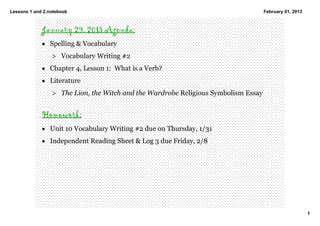
Chapter 4, Lessons 1 - 2
- 1. Lessons 1 and 2.notebook February 01, 2013 January 29, 2013 Agenda: • Spelling & Vocabulary > Vocabulary Writing #2 • Chapter 4, Lesson 1: What is a Verb? • Literature > The Lion, the Witch and the Wardrobe Religious Symbolism Essay Homework: • Unit 10 Vocabulary Writing #2 due on Thursday, 1/31 • Independent Reading Sheet & Log 3 due Friday, 2/8 1
- 2. Lessons 1 and 2.notebook February 01, 2013 Lesson 1: What is a Verb? VERBS! A verb is a word used to express an action, a condition, or a state of being. Action Verb: Linking Verbs: • tells what the subject • links its subject doesthe action can be physical or to a word in the predicate. mental. Most common Linking Verbs : Early humans moved constantly. be: is, am, are, was, were, been express condition: appear, feel, They carried few possessions. become, grow, look, remain, seem, smell, taste, sound People worried about survival. Early humans were food They feared large animals. gatherers. They often felt hungry. 2
- 3. Lessons 1 and 2.notebook February 01, 2013 Helping Verbs and Verb Phrases • Helping Verbs: Help main verbs express action or precise shades of meaning • Verb Phrases: The combination of one or more helping verbs with a main verb Animals could carry the humans' heavy loads farther. Then people would travel farther. Common Helping Verbs: Be: be, am, is, are, was, were, been, being Do: do, does, did Have: have, has, had Other: could, should, would, may, might, must, can, shall, will 3
- 4. Lessons 1 and 2.notebook February 01, 2013 1. Transportation developed along with civilization. 2. Half a million years ago, humans traveled frequently. 3. They searched for food like nuts and berries. 4. They hunted animals on foot. 5. Later they used beasts of burden. 6. They had invented sledges by 5000 B.C. 7. These sledlike vehicles could move tons of weight. 8. Around 3500 B.C., someone created the wheel. 9. With wheels on vehicles, people could travel long distances. 10. The wheel was one of the most important inventions ever. 4
- 5. Lessons 1 and 2.notebook February 01, 2013 5
- 6. Lessons 1 and 2.notebook February 01, 2013 January 30, 2013 Agenda: • Literature > The Lion, the Witch and the Wardrobe Religious Symbolism Essay Homework: • Unit 10 Vocabulary Writing #2 due on Thursday, 1/31 • Independent Reading Sheet & Log 3 due Friday, 2/8 6
- 7. Lessons 1 and 2.notebook February 01, 2013 February 1, 2013 Agenda: • Spelling & Vocabulary > Unit 11 Spelling PreTest, Grade & Lists • Grammar > Chapter 4, Lesson 2: Action Verbs & Objects • Literature > The Lion, the Witch and the Wardrobe Religious Symbolism Essay Homework: • Independent Reading Sheet & Log 3 due Friday, 2/8 7
- 8. Lessons 1 and 2.notebook February 01, 2013 Lesson 2: Action Verbs and Objects Action verbs are often accompanied by words that complete their meaning. These complements are called direct objects or indirect objects. Direct Objectnoun or a pronoun that names the receiver of a verb's action Americans love the automobile. Cars changed our society. Indirect Objecttells to what or whom or for what or whom an action has been done Sue gave her sisters a ride. Sue gave them a ride. *If a preposition is in the sentence, the word that follows the preposition is NOT an Indirect Object, but an Object of the Preposition. 8
- 9. Lessons 1 and 2.notebook February 01, 2013 Transitive and Intransitive Verbs An action verb that has a direct object is called a TRANSITIVE VERB. An verb that does not have a direct object is called a INTRANSITIVE VERB. Good drivers avoid accidents. They stay alert. Sometimes an intransitive verb is followed by a word that looks like a direct object, but it is really an adverb. An adverb tells where, when, how, or to what extent; a direct object answers the question who or what. Some people drive trucks Some people drive carelessly. 9
- 10. Lessons 1 and 2.notebook February 01, 2013 1. Experience tells us the risks of different vehicles. 2. In 1769 NicholasJoseph Cugnot showed the world the first automobile. 3. His vehicle had three wheels. 4. Steam power gave the vehicle a speed of about two miles per hour. 5. The auto had difficulties, however. 6. This fact gave Cugnot another place in history. 10
- 11. Lessons 1 and 2.notebook February 01, 2013 11
- 12. Attachments VERBS!